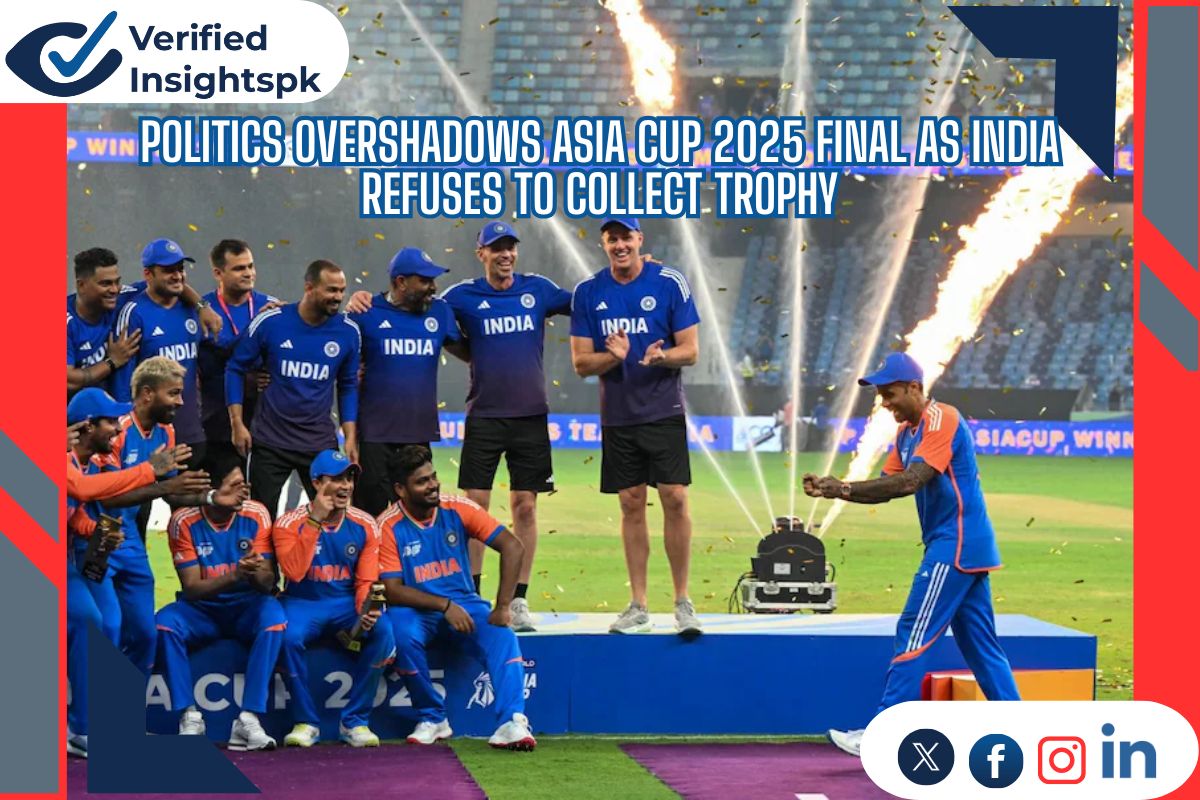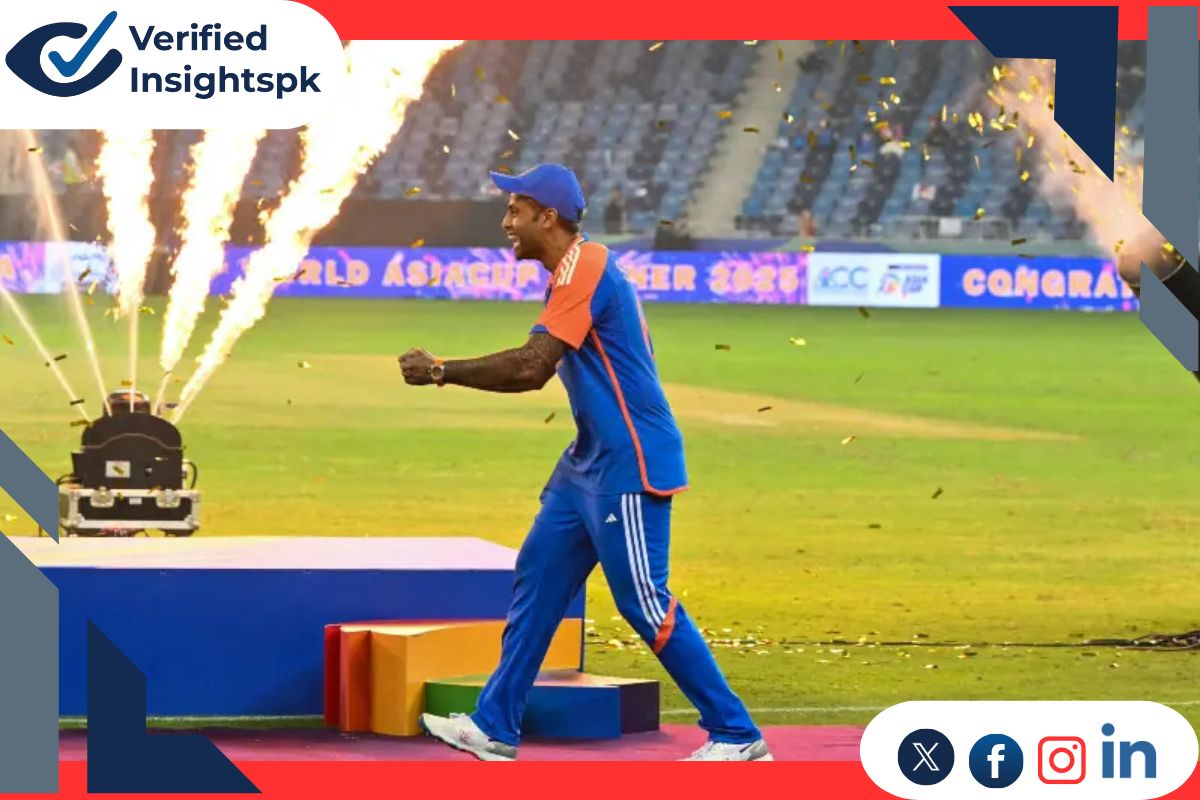
Politics Overshadows Asia Cup 2025 Final as India Refuses to Collect Trophy
The Asia Cup 2025 Twenty20 final between India and Pakistan in Dubai was supposed to be remembered for thrilling cricket. Instead, it has become one of the most controversial matches in the history of the sport. India won the match and secured their record-extending ninth Asia Cup title. Still, politics overshadowed the celebrations as the Indian team refused to collect the winners’ trophy from Asian Cricket Council (ACC) and Pakistan Cricket Board (PCB) chairman Mohsin Naqvi.
This unprecedented move, combined with political statements from both sides. And has turned the Asia Cup into a fresh battleground for India-Pakistan tensions.
India’s Refusal to Take the Trophy (Asia Cup 2025)

The post-match presentation descended into chaos when Indian captain Suryakumar Yadav and his team refused to accept the trophy from Mohsin Naqvi, who also serves as Pakistan’s Interior Minister.
Broadcaster Simon Doull confirmed the decision live, saying:
“I have been informed by the ACC that the Indian cricket team will not be collecting their awards tonight.”
There were no customary handshakes between the two teams either, marking another historic low in cricketing relations. Instead of the usual moment of sportsmanship, only Pakistan captain Salman Ali Agha received the runner-up cheque, while a few Indian players collected individual awards separately.
Modi’s Political Remarks
The political overtones were heightened further when Indian Prime Minister Narendra Modi posted on X (formerly Twitter) after the match:
“Operation Sindoor on the game’s field. The outcome is the same, India wins! Congrats to our cricketers.”
The reference to Operation Sindoor, a military campaign India carried out against Pakistan earlier this year, immediately sparked outrage in Pakistan. The remark was widely criticised as an attempt to link war and politics with cricket.
Mohsin Naqvi’s Strong Response
ACC and PCB chief Mohsin Naqvi hit back strongly at Modi’s remarks. In a public statement, Naqvi warned India against “dragging war into sports,” saying it showed only desperation and undermined the spirit of the game.
He added:
“If war were your measure of pride, history already records your humiliating defeats at Pakistan’s hands. No cricket match can rewrite that truth.”
Naqvi’s remarks reflected Pakistan’s growing frustration, not just over Modi’s political rhetoric but also over India’s refusal to participate in the usual post-final traditions.
Match Summary: A Thriller Overshadowed
The final itself was a dramatic contest. Pakistan put up 146 runs after a strong opening stand of 84 runs between Sahibzada Farhan (57) and Fakhar Zaman (46). However, the rest of the batting collapsed spectacularly, with the team losing nine wickets for just 33 runs.
India’s left-arm spinner Kuldeep Yadav played a match-winning role, claiming four wickets for 30 runs.
Chasing 147, India faced early shocks, losing three top-order batsmen, including captain Suryakumar Yadav, inside 10 deliveries. At one stage, India was 20 for 3.
Youngster Tilak Varma steadied the innings with crucial partnerships, while Sanju Samson (24) and Shivam Dube (33) kept the chase alive. In the final over, Varma smashed a six off Haris Rauf to seal the victory for India.
Despite the brilliant cricket, celebrations were marred by political drama and India’s refusal to accept the trophy.
PCB’s Gesture for May 7 Victims
In a separate statement, the Pakistan Cricket Board announced that the national team had donated its match fees to the families of civilians martyred during the May 7 Indian attack on Pakistan.
The PCB wrote:
“The Pakistan Cricket Team has dedicated its Asia Cup final match fees to the innocent victims martyred in the May 7 attack, in which civilians, including children, lost their lives. Our thoughts and prayers are with their families.”
This act of solidarity underscored how the shadow of the May conflict continues to cast a pall over sporting ties between the two nations.
Pakistan’s Captain Speaks Out
Pakistan skipper Salman Ali Agha expressed deep disappointment at India’s behaviour after the final.
He said:
“What they did today, a good team doesn’t do that. Good teams wait, respect traditions, and respect the game.”
He added that India’s refusal to shake hands or accept the trophy was not just a disrespect to Pakistan but also to cricket itself.
Verified Insights PK Remarks
At Verified Insights PK, the Asia Cup 2025 final has once again shown how cricket between India and Pakistan is never just about sport. What should have been a day to celebrate thrilling cricket was instead dominated by politics and hostility.
The refusal to collect the trophy, Modi’s war-linked remarks, and the lack of basic sportsmanship reflect poorly on the future of cricket diplomacy. Fans on both sides deserved better. Cricket is meant to unite, not divide, but this final has deepened mistrust between the two nations.
The actions of leaders and players alike demonstrate the fragility of peace between India and Pakistan. Unless sports are kept separate from politics, every match risks becoming another flashpoint instead of a moment of joy.
Final Word
The Asia Cup 2025 will be remembered. It is not for the boundaries or wickets but for the political boundaries that crossed into cricket. It was a reminder that in South Asia, cricket is not just a game; it is a mirror of the larger conflict, carrying with it hopes, frustrations, and unresolved rivalries.










